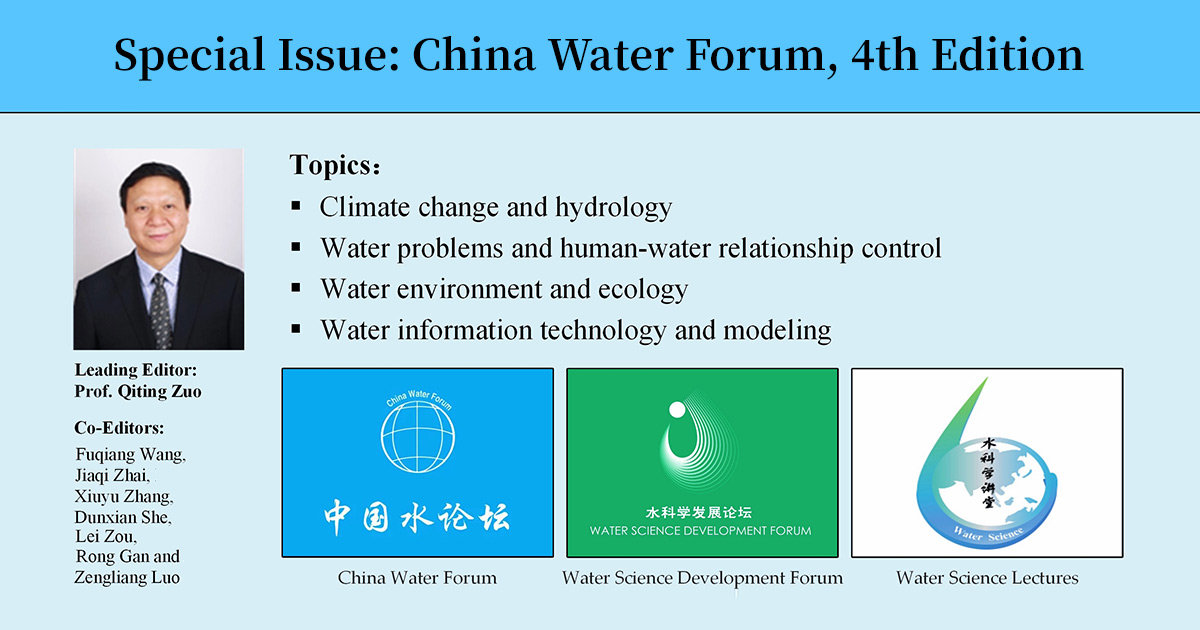- 3.0Impact Factor
- 6.0CiteScore
- 19 daysTime to First Decision
China Water Forum, 4th Edition
This special issue belongs to the section “Hydrology“.
Special Issue Information
Dear Colleagues,
Affected by global climate change and rapid socio-economic development, China suffers from severe water security pressure, especially in terms of water shortages, flood disasters, and water-related ecological and environmental problems. The solution to these problems requires comprehensive research across different disciplines.
Focusing on discussing China’s water issues, we carried out a series of academic exchanges over a long period. The well-known “China Water Forum”, launched in 2003 and held annually, focuses on discussing solutions to China’s water issues. By 2024, the forum had been successfully held for 21 sessions. “Water Science Development Forum”, launched in 2007 and held annually, focuses on promoting the multidisciplinary integration of other disciplines with water science research. By 2024, the forum had been successfully held for 17 sessions. “Water Science Lectures”, launched in 2021, is an open, shared, and non-profit public welfare lecture. A report will be arranged for each lecture, which will be given and presided over by invited famous researchers.
The Editorial Department of Water Journal cooperates with “China Water Forum”, “Water Science Development Forum”, and “Water Science Lectures” to set up a series of columns. At least one column is planned each year currently. The column established in 2025 is “China Water Forum, 4th Edition”. We welcome scholars and graduate students participating in the above-mentioned conferences, as well as scholars who study water issues in China, to submit full texts of their unpublished manuscripts. The received papers will be professionally peer-reviewed and recommended for publication by the Editorial Board.
We invite submissions on, but not limited to, the following topics:
(1)Climate change and hydrology (Director: Dunxian She, Rong Gan);
(2)Water problems and human–water relationship control (Director: Zengliang Luo, Qiting Zuo);
(3)Water environment and ecology (Director: Fuqiang Wang, Jiaqi Zhai);
(4)Water information technology and modeling (Director: Lei Zou, Xiuyu Zhang).
Prof. Dr. Qiting Zuo
Prof. Dr. Fuqiang Wang
Prof. Dr. Jiaqi Zhai
Prof. Dr. Xiuyu Zhang
Prof. Dr. Dunxian She
Dr. Lei Zou
Dr. Rong Gan
Prof. Dr. Zengliang Luo
Guest Editors
Manuscript Submission Information
Manuscripts should be submitted online at www.mdpi.com by registering and logging in to this website. Once you are registered, click here to go to the submission form. Manuscripts can be submitted until the deadline. All submissions that pass pre-check are peer-reviewed. Accepted papers will be published continuously in the journal (as soon as accepted) and will be listed together on the special issue website. Research articles, review articles as well as short communications are invited. For planned papers, a title and short abstract (about 250 words) can be sent to the Editorial Office for assessment.
Submitted manuscripts should not have been published previously, nor be under consideration for publication elsewhere (except conference proceedings papers). All manuscripts are thoroughly refereed through a single-blind peer-review process. A guide for authors and other relevant information for submission of manuscripts is available on the Instructions for Authors page. Water is an international peer-reviewed open access semimonthly journal published by MDPI.
Please visit the Instructions for Authors page before submitting a manuscript. The Article Processing Charge (APC) for publication in this open access journal is 2600 CHF (Swiss Francs). Submitted papers should be well formatted and use good English. Authors may use MDPI's English editing service prior to publication or during author revisions.
Keywords
- climate change and hydrological evolution
- water resources evaluation, planning, and management
- flood, drought and water security
- human–water relationship and comprehensive control
- ecohydrology and water environment protection
- groundwater resources and environment
- water information technology and digital twin basins
- national water network and major water conservancy projects
- water policy and water control strategy
- “carbon peak and neutrality” target and water resources

Benefits of Publishing in a Special Issue
- Ease of navigation: Grouping papers by topic helps scholars navigate broad scope journals more efficiently.
- Greater discoverability: Special Issues support the reach and impact of scientific research. Articles in Special Issues are more discoverable and cited more frequently.
- Expansion of research network: Special Issues facilitate connections among authors, fostering scientific collaborations.
- External promotion: Articles in Special Issues are often promoted through the journal's social media, increasing their visibility.
- Reprint: MDPI Books provides the opportunity to republish successful Special Issues in book format, both online and in print.
Related Special Issues
- China Water Forum 2022inWater (12 articles)
- China Water Forum 2023inWater (11 articles)
- China Water Forum 2024inWater (9 articles)


